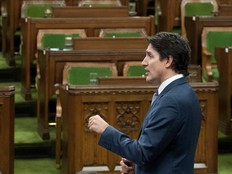Rex Murphy: Egypt crisis leaves Obama diminished
Article content

Singular or great events have been the prism through which some politicians find the measure of themselves.
The dynamic is familiar from history. Great challenges or crises sometimes call out the extrordinary personalities or leaders that alone can deal with such challenges or crises. The time, so to speak, evokes its redeemer. Not invariably. We are not always lucky. Not every crisis finds its manager. But then, lucky we sometimes are: we have but to think of Lincoln and Churchill — two men whose extraordinary abilities and capacity were only to be revealed in their full scope and exercise, stimulated into existence by (in their case) — the near apocalpytic challenges they had to face.
No one who succeeds to the office of the American presidency can hope to escape a moment of great and defining crisis. It is the conduct of a presidents during such times, in the face of such events — as, for example, Kennedy in the showdown with the Soviet Union in the Cuban missile crisis, or Bush after 9/11 — how quickly they discern the patterns at play, and above all how they project a sense of command and confidence during a crisis, that gives the measure of their stature as leaders.Egypt was Barack Obama’s prism moment. Does he stand taller now after those hisitorical three weeks of suspensful and anxious street revolution? Did he sense, in the manner of all first-rate leaders, from the beginning what was at play, what motions either of nuance or power he could exert to guide events to their best end? Did he accuratelly appreciate America’s interest in these unfolding drama? And could he read the flow of events in a foreign land, sense their potential contagion — which we are now seeing — for other countries in the region?
Crucially, was Mr. Obama, with all the powers and prestige of the American presidency, seen to be an actor in these events or their most illustrious spectator? Did he articulate a coherent reading of the Egyptian crisis in a manner that made him, at least in some part, an overseer and a guide to those events as they unfolded? Did he project from the great pulpit of the White House onto the Egyptian streets some sense of America’s real empathy of what the citizens in those streets were calling for?
Quite the contrary, interviews on the spot revealed how little respect some in Cairo’s square had for him, and their disapppointment that this “new” politician had so little that was really new about him at all.
From the first stirrings in Egypt almost to the very present minute, the President’s response has been an ambiguous shuffle, veering from hypercaution over offending the regime, to soap-bubble platitudes meant to tease approval from, but actually ignored or despised by, the protesting crowds. Obama won no new worshippers in Tahrir Square. What we saw was a President as bystander and occasional chorus, waiting upon events, and clearly without a conceptual or even an instinctive feel for what was unfolding,
This was not the lightworker President his more enthusiastic fans thought they had voted for. Obama is not as large as the times demand or the office he holds. He presides more than he leads. He’s everyone’s favourite master of ceremonies. He’s great for state pomp and show, the display moments of the American presidency. But when the day darkens and events begin to roil, Obama does not fill the space a real leader needs to fill.
Cairo this was the week to have given it. There was none.
Words, as Mr. Obama himself rather frequently declared in his campaign, are important.
It’s difficult to imagine Ronald Reagan not having found the right and balanced words to match the great turning we are seeing, some formula that declared America on the side of true reform and change in Egypt and beyond, and thereby having made American a partner in that change.
Obama, once in office, however, seems to have lost what we thought was his defining ability — the use of language to tutor events.
Perhaps it is only when Mr. Obama’s fortunes are at stake that his rhetoric has the needful foundation for its better reaches. Which is a most disappointing takeaway from a presidency that had inspired such gigantic hopes.National Post










